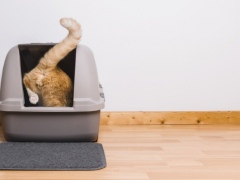
With an estimated total of 3.2 million cats entering U.S. animal shelters every year, it’s sad to say that many of our feline friends have faced trauma and heartbreak.
Not every rescue cat has been abandoned, but being dumped, left behind, and forgotten are unfortunate trends. Animal shelters accept as many of these abandoned animals as possible and do their best to find them new homes.
Even in best-case scenarios and perfect adoptions, however, we can’t erase a cat’s past. From the moment a pet is left on the side of the road or dumped with a hostile colony of feral cats, they are forever changed. The question many animal rescuers ask themselves is, “Do cats remember being abandoned?” And if so, what can we do to help?
Your Cat’s Memory for Short-Term Information
Like humans, cats have two different types of memory. Short-term memory, also called the working memory, is the ability to recall facts and information for up to minutes at a time. This is how people remember their server’s name at a restaurant and how cats know that you hid the catnip bag behind your back.
Studies on feline short-term memory give a wide range of answers to how well cats remember things in the moment. A study from 2006, for example, found that cats had a very limited short-term memory (only a few seconds) when it came to finding hidden objects. Another experiment conducted in 2007, however, found that cats have excellent short-term memories when faced with visual and physical challenges. In this study, cats were encouraged to walk a path that required them to step over obstacles.
Even when the cats could no longer see the obstacles, they remembered they were there and successfully stepped over them. This experiment also utilized repetition, which scientists believe reinforces short-term memory.
It’s hard to say exactly how much a cat remembers short term events, but PetMD reports feline memories are especially strong when it comes to their own survival and well-being. They’ll remember where you accidentally dropped a treat under the couch, for example, but they might not care to remember something else that isn’t directly related to food, water, or shelter.
Assuming cats have an adequate short-term memory, how does that relate to their experiences being abandoned?
Being left behind by someone they previously relied on for survival is both emotionally and physically triggering. Being in a new environment or suddenly being without their usual comforts is impossible to ignore. In fact, the related negative emotions are usually strong enough to create memories that last much longer.

Experts report that when a cat remembers events, they most likely don’t replay the experience like a movie in their head like what humans tend to do.
The Power of Long-Term Memory
Like short-term memory, a cat’s long-term memory is especially strong when related to events that directly affect their current survival and well-being. Potentially even more impactful, however, are the emotions the cat felt during that specific experience. The stronger the emotion is, the more likely the cat is to remember it.
Whether or not a cat will remember the exact moment they saw their irresponsible human drive off, however, is different than remembering the feelings associated with that experience. Experts report that when a cat remembers events, they most likely don’t replay the experience like a movie in their head like what humans tend to do. Instead, they remember the strong emotions associated with the event.
An abandoned cat won’t remember what shirt their person was wearing the last time they saw them or even if they were driven in a car before being left all alone. They will, however, remember feelings of being scared, stressed, and confused.
Abandonment is always traumatizing. Knowing this, most feline experts agree that cats are more than capable of remembering the fact that they were once abandoned by people they used to trust. The emotions that become associated with that experience are likely so strong, that the cat can hold onto those retained feelings for years.
Senior Cat Wellness says cats can potentially remember significant feelings and events for up to 10 years. That ability wanes, however, as cats age and lose brain cells used for memory. It’s also believed that older cats are more likely to be affected by abandonment than kittens.
This is because they’ve had more time to grow accustomed to people, a daily routine, and environment. A sudden change is more life-altering for them than a kitten that has only been in a home for a few weeks.
How To Help Your Recently Abandoned Cat
If you suspect that your new cat remembers being recently abandoned, the best thing you can do is provide them with stability and time. Even without the added trauma of being abandoned, it can take anywhere from one to six months for a newly adopted cat to fully adjust to a new life. If your cat’s past was especially hard, it could be even longer for them to feel completely comfortable and secure in a loving home.
It’s not uncommon for recently rehomed cats to display behavioral issues including litter box mishaps, constant hiding, and even aggression. The American Veterinary Medical Association also reports that some cats going through a major change develop “sickness behaviors” even if they’re healthy. All of these behaviors suggest the cat is feeling stressed, scared, or confused.
They likely recognize that they’ve lost something (the stability from their previous home) and it will take time for them to recognize what they’ve also gained.
Talk to your vet if you fear your cat’s health is seriously at risk, but most newly adopted cats need to decompress from the stressors of adoption. Let them explore their new home at their own pace and offer rewards and positive reinforcement when appropriate.
Providing stability and affection (as long as it’s appreciated) is often the best way new owners can help a cat overcome anxieties and phobias associated with past experiences.
Being kind and patient with your new cat won’t erase their memory of being abandoned. It will, however, help them heal and move forward. With time, the trauma they experienced could fade into the background, and those hurtful emotions will no longer affect their everyday life.

Providing stability and affection (as long as it’s appreciated) is often the best way new owners can help a cat overcome anxieties and phobias associated with past experiences.
Also Read: Cat Separation Anxiety: Causes, Symptoms, And Treatment
-
https://www.seniorcatwellness.com/do-cats-miss-their-owners-when-rehomed/
-
https://avmajournals.avma.org/view/journals/javma/238/1/javma.238.1.67.xml
-
https://www.researchgate.net/publication/6689849_Long-Lasting_Context-Dependent_Modification_of_Stepping_in_the_Cat_After_Repeated_Stumbling-Corrective_Responses
-
https://www.petful.com/behaviors/cats-memories/







